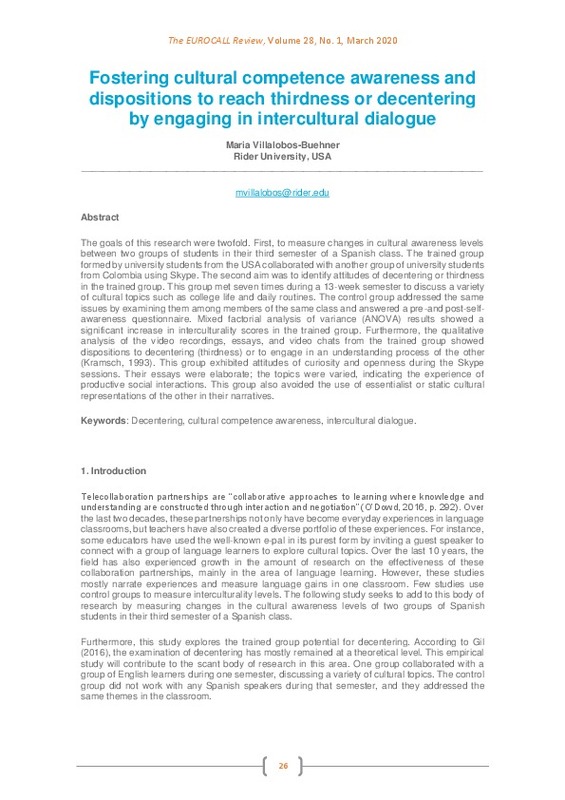JavaScript is disabled for your browser. Some features of this site may not work without it.
Buscar en RiuNet
Listar
Mi cuenta
Estadísticas
Ayuda RiuNet
Admin. UPV
Fostering cultural competence awareness and dispositions to reach thirdness or decentering by engaging in intercultural dialogue
Mostrar el registro sencillo del ítem
Ficheros en el ítem
| dc.contributor.author | Villalobos-Buehner, Maria
|
es_ES |
| dc.date.accessioned | 2020-06-16T09:32:40Z | |
| dc.date.available | 2020-06-16T09:32:40Z | |
| dc.date.issued | 2020-03-31 | |
| dc.identifier.issn | 1695-2618 | |
| dc.identifier.uri | http://hdl.handle.net/10251/146452 | |
| dc.description.abstract | [EN] The goals of this research were twofold. First, to measure changes in cultural awareness levels between two groups of students in their third semester of a Spanish class. The trained group formed by university students from the USA collaborated with another group of university students from Colombia using Skype. The second aim was to identify attitudes of decentering or thirdness in the trained group. This group met seven times during a 13-week semester to discuss a variety of cultural topics such as college life and daily routines. The control group addressed the same issues by examining them among members of the same class and answered a pre-and post-self-awareness questionnaire. Mixed factorial analysis of variance (ANOVA) results showed a significant increase in interculturality scores in the trained group. Furthermore, the qualitative analysis of the video recordings, essays, and video chats from the trained group showed dispositions to decentering (thirdness) or to engage in an understanding process of the other (Kramsch, 1993). This group exhibited attitudes of curiosity and openness during the Skype sessions. Their essays were elaborate; the topics were varied, indicating the experience of productive social interactions. This group also avoided the use of essentialist or static cultural representations of the other in their narratives. | es_ES |
| dc.language | Inglés | es_ES |
| dc.publisher | Universitat Politècnica de València | es_ES |
| dc.relation.ispartof | The EuroCALL Review | es_ES |
| dc.rights | Reconocimiento - No comercial - Sin obra derivada (by-nc-nd) | es_ES |
| dc.subject | Decentering | es_ES |
| dc.subject | Cultural competence awareness | es_ES |
| dc.subject | Intercultural dialogue | es_ES |
| dc.title | Fostering cultural competence awareness and dispositions to reach thirdness or decentering by engaging in intercultural dialogue | es_ES |
| dc.type | Artículo | es_ES |
| dc.identifier.doi | 10.4995/eurocall.2020.12206 | |
| dc.rights.accessRights | Abierto | es_ES |
| dc.description.bibliographicCitation | Villalobos-Buehner, M. (2020). Fostering cultural competence awareness and dispositions to reach thirdness or decentering by engaging in intercultural dialogue. The EuroCALL Review. 28(1):26-39. https://doi.org/10.4995/eurocall.2020.12206 | es_ES |
| dc.description.accrualMethod | OJS | es_ES |
| dc.relation.publisherversion | https://doi.org/10.4995/eurocall.2020.12206 | es_ES |
| dc.description.upvformatpinicio | 26 | es_ES |
| dc.description.upvformatpfin | 39 | es_ES |
| dc.type.version | info:eu-repo/semantics/publishedVersion | es_ES |
| dc.description.volume | 28 | es_ES |
| dc.description.issue | 1 | es_ES |
| dc.relation.pasarela | OJS\12206 | es_ES |
| dc.description.references | Angelova, M., & Zhao, Y. (2014). Using an online collaborative project between American and Chinese students to develop ESL teaching skills, cross-cultural awareness and language skills. Computer Assisted Language Learning, 29(1). https://doi.org/10.1080/09588221.2014.907320 | es_ES |
| dc.description.references | Byram, M. (1997). Teaching and assessing intercultural communicative competence. Clevedon, UK: Multilingual Matters. | es_ES |
| dc.description.references | Byram, M., Gribkova, B., & Starkey, H. (2002). Developing and intercultural dimension in language teaching. A practical introduction for teachers. Council of Europe, Strasbourg. | es_ES |
| dc.description.references | Çiftçi, E.Y., & Savaş, P. (2017). The role of telecollaboration in language and intercultural learning: A synthesis of studies published between 2010 and 2015. ReCALL, 30(3). https://doi.org/10.1017/S0958344017000313 | es_ES |
| dc.description.references | Dugartsyrenova, V.A., & Sardegna, V.G. (2018). Raising intercultural awareness through voicebased telecollaboration: perceptions, uses, and recommendations,Innovation in Language Learning and Teaching, 13(3). https://doi.org/10.1080/17501229.2018.1533017 | es_ES |
| dc.description.references | Gil, G. (2016). Third places and the interactive construction of interculturality in the English as foreign/additional language classroom. Acta Scientiarum. Language and Culture, 38(4), 337- 346. https://doi.org/10.4025/actascilangcult.v38i4.28674 | es_ES |
| dc.description.references | Helm, F., Guth, S., & Farrag, M. (2012). Promoting dialogue or hegemonic practice? Power issues in telecollaboration. Language Learning & Technology, 16(2), 103-127. Retrieved from http://llt.msu.edu/issues/june2012/helmguthfarrah.pdf | es_ES |
| dc.description.references | Kramsch, C. (1993). Context and Culture in Language Teaching. Oxford, UK: Oxford University Press. | es_ES |
| dc.description.references | López-Rocha, S. (2016). Intercultural communicative competence: creating awareness and promoting skills in the language classroom. In C. Goria, O. Speicher, & S. Stollhans (Eds), Innovative language teaching and learning at university: enhancing participation and collaboration (pp. 105-111). Dublin: Research-publishing.net. https://doi.org/10.14705/rpnet.2016.000411 | es_ES |
| dc.description.references | O'Dowd, R. (2003). Understanding the "other side": Intercultural learning in a Spanish-English e-mail exchange. Language Learning & Technology, 7(2), 118-144. DOI: 10125/25202 | es_ES |
| dc.description.references | O'Rourke, B. (2007). Models of telecollaboration (1): E(tandem). In R. O'Dowd (Ed.), Online intercultural exchange: An introduction for foreign language teachers (pp. 41-62). Clevedon, UK: Multilingual Matters. | es_ES |
| dc.description.references | Schenker, T. (2012). Intercultural Competence and Cultural Learning through Telecollaboration. Calico, 29(3), 449-470. https://www.jstor.org/stable/10.2307/calicojournal.29.3.449 | es_ES |
| dc.description.references | Western, Center for Research and Education on Violence Against Women and Children (2017). Cultural competence self-assessment checklist. Retrieved from: http://rapworkers.com/wp-content/uploads/2017/08/cultural-competence-selfassessmentchecklist-1.pdf | es_ES |








